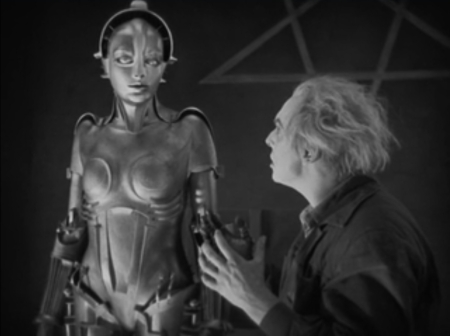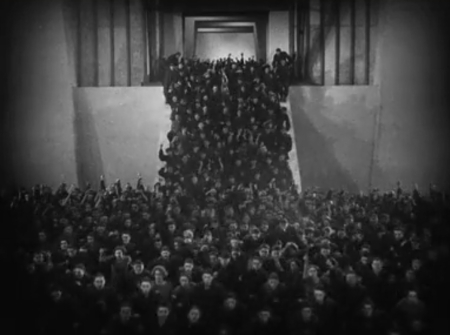
The futuristic city of Metropolis is two worlds in one. Above ground, the privileged portion of the populace, including wealthy businessmen and their sons, leads a life of pleasure and ease; meanwhile, deep under the earth’s surface, workers toil away for hours and hours at backbreaking jobs in order to make that lifestyle possible, never getting to partake in the fruits of their labor. A young man named Freder (Gustav Fröhlich) — whose powerful father, Joh Fredersen (Alfred Abel), made Metropolis what it is — is blissfully ignorant of the workers’ misery until one day when he pays a visit to the city’s Eternal Gardens. His frolics with the women there are interrupted by the appearance of an unknown, simply dressed woman (Brigitte Helm) and a group of ragged children. “Look! These are your brothers!” she tells her young followers, the offspring of the workers. They’re all quickly shown the door, but Freder is both smitten and intrigued, and he decides to chase after her.
He ends up underground, where he witnesses one of the gargantuan machines overheating and exploding, injuring many workers; to his eyes, it looks like the god Moloch consuming a human sacrifice. This experience is a total revelation to Freder. From that moment on, he becomes determined to understand the workers, even to switch lives with them — much to his father’s concern.

Joh is also troubled by plans found on two of the men involved in the explosion, suggesting that a rebellion or something similarly secretive may be afoot. In hopes of finding an answer, he visits inventor (read: mad scientist) Rotwang (Rudolf Klein-Rogge), who leads him to the two-thousand-year-old catacombs deep below Metropolis. There, the workers gather to listen to Maria, the woman whom Freder saw earlier. A sort of prophetess, she tells her listeners that a mediator (“the heart”) will come to reconcile the elites (“head”) and the workers (“hands”), because the two sides are unable to understand each other as things currently stand. Although the crowd trusts her, one man declares that they won’t wait for the mediator much longer
Upon hearing this, Joh comes up with a plan: Rotwang should alter the robot he’s created so that it looks exactly like Maria, and it can then be used to manipulate the workers and destroy their faith in her. The inventor agrees to help him, but he has ulterior motives. Years ago, Joh stole the love of his life, a woman named Hel who became Freder’s mother and subsequently died. Rotwang never got over the loss — in fact, he has a massive shrine to Hel in his house, and he built the robot as a means of bringing her back to life — so he sees this as a golden opportunity for revenge, a chance to destroy Joh, Freder and the city itself in one fell swoop.

It’s not by chance, really, that I saved Fritz Lang’s 1927 film Metropolis for last in my blind spot series. Two-and-a-half-hour German silents are inherently daunting, at least to me, and this one’s lofty reputation made it all the more intimidating. When it opened with an epigram declaring, in all capital letters, that “the mediator between brain and hands must be the heart,” I became even warier; it sounded as if I was in for a very long, very didactic viewing experience.
Despite my misgivings, I found that the movie not only lived up to its reputation but was also quite enjoyable and entertaining. While it can be didactic at times, there’s so much more going on that it doesn’t feel incessantly preachy. It’s rather an odd hodgepodge of elements — science fiction, class conflict, heavy religious overtones, romance, family drama and 1920s decadence among them. Still, somehow, it holds together well, perhaps because of the film’s epic scale. Metropolis is visually striking throughout, and the often mammoth sets and the enormous cast of extras contribute a great deal through their size alone.

I also found that it moved along surprisingly quickly, despite its lengthy runtime; as the summary above indicates, there’s a lot packed into it. For what it’s worth, I watched the 2010 restoration of the film, which incorporates long-lost footage discovered in Argentina two years earlier and is nearly complete. (A few missing scenes are summarized via intertitles.) It would be interesting to see one of the shorter cuts that circulated for decades after the initial release, if only for the sake of comparison; that said, I’m glad that when I finally watched Metropolis, I got to see it as Lang intended — almost, anyway.
This post is part of the 2016 Blind Spot Series, hosted by The Matinee. My full list can be found here.


I gasped when I saw the words “Blind Spot Series” and “Metropolis” in your post title, but I was so pleased to read your review. Like you, I avoided watching this film because I didn’t think it could live up to its reputation. But once I started watching, I was hooked.
Agreed – watching one of the shorter versions would be interesting for comparison.
LikeLiked by 1 person
I’m glad I’m not the only one! I think this was probably the biggest blind spot on my list, and it’s good that I included it on there; I don’t know when I would have gotten around to it otherwise. It also made me want to watch more of Lang’s silent work, and more of his work in general, because I’d only seen three of his sound films prior to watching Metropolis.
LikeLiked by 1 person
Metropolis is so iconic and groundbreaking, so it totally makes sense to feel intimidated by it. I actually watched the public domain version of the film prior to the restoration and have yet to see the restored version, so I will be the taking the opposite approach!
LikeLiked by 1 person
That should be interesting! The nice thing about watching the shorter cut of a movie first is that it’s easier to see the differences, because new scenes and moments in the longer version stand out. It can be harder to tell what was cut if you go from the long version to the short, unless you watch them in close succession.
LikeLiked by 1 person
Great review! I agree about what you said in regard to the film’s quick pace and it’s surprising consistency in light of the multiple different elements involved. I think it’s kind of interesting that it’s almost safe to say that the film kind of shows what would have happened had the Tower of Babel story in Genesis actually been successful. Anyway, I really like this blog, and I look forward to reading more!
LikeLiked by 1 person
Thank you! That’s a great point about the Tower of Babel story, and one that I hadn’t considered. It would be interesting to see how the new understanding between the two sides would play out in day-to-day life going forward, but I guess that’s up to our imagination.
LikeLike